

Ethics in the Classroom: What You Need to Know. Ethics and morals are often associated with religion, but schools can also provide important lessons in ethical thinking and action.
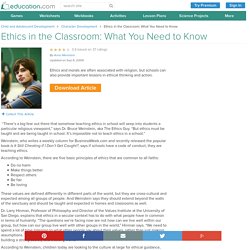
“There’s a big fear out there that somehow teaching ethics in school will seep into students a particular religious viewpoint,” says Dr. Bruce Weinstein, aka The Ethics Guy. “But ethics must be taught and are being taught in school. It’s impossible not to teach ethics in a school.” Weinstein, who writes a weekly column for BusinessWeek.com and recently released the popular book Is It Still Cheating if I Don’t Get Caught? According to Weinstein, there are five basic principles of ethics that are common to all faiths: Do no harm Make things better Respect others Be fair Be loving These values are defined differently in different parts of the world, but they are cross-cultural and expected among all groups of people. Dr. Hinman, too, is concerned with cheating—particularly students’ difficulty in understanding how it is harmful. Do No Harm. Ethics. The three major areas of study within ethics are:[1] Meta-ethics, concerning the theoretical meaning and reference of moral propositions, and how their truth values (if any) can be determinedNormative ethics, concerning the practical means of determining a moral course of actionApplied ethics, concerning what a person is obligated (or permitted) to do in a specific situation or a particular domain of action[1] Defining ethics[edit]
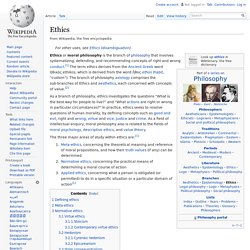
Creative Commons license. This video explains how Creative Commons licenses can be used in conjunction with commercial licensing arrangements A Creative Commons (CC) license is one of several public copyright licenses that enable the free distribution of an otherwise copyrighted "work".
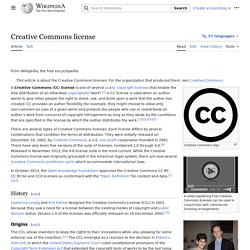
[note 1] A CC license is used when an author wants to give other people the right to share, use, and build upon a work that they (the author) have created. CC provides an author flexibility (for example, they might choose to allow only non-commercial uses of a given work) and protects the people who use or redistribute an author's work from concerns of copyright infringement as long as they abide by the conditions that are specified in the license by which the author distributes the work.[1][2][3][4][5] There are several types of Creative Commons licenses.
Circ21. Stanford Copyright and Fair Use Center. 10 Big Myths about copyright explained. See EFF notes on fair use and links from it for a detailed answer, but bear the following in mind: The "fair use" exemption to (U.S.) copyright law was created to allow things such as commentary, parody, news reporting, research and education about copyrighted works without the permission of the author.
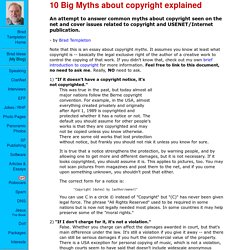
That's vital so that copyright law doesn't block your freedom to express your own works -- only the ability to appropriate other people's. Intent, and damage to the commercial value of the work are important considerations. Are you reproducing an article from the New York Times because you needed to in order to criticise the quality of the New York Times, or because you couldn't find time to write your own story, or didn't want your readers to have to register at the New York Times web site? The first is probably fair use, the others probably aren't.
Fair use is generally a short excerpt and almost always attributed. See the DMCA alert for recent changes in the law. False. False. Cb copyright. CopyrtQuiz. ELI7023. Creative Commons. A Fair(y) Use Tale. Copyright chart. The Educator's Guide to Copyright and Fair Use. A five-part series When it comes to copyright law and the application of fair use exceptions, ignorance is definitely not bliss!
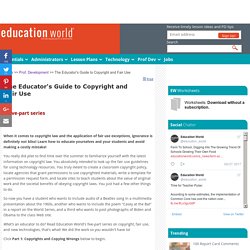
Learn how to educate yourselves and your students and avoid making a costly mistake! You really did plan to find time over the summer to familiarize yourself with the latest information on copyright law. You absolutely intended to look up the fair use guidelines for using technology resources. You truly meant to create a classroom copyright policy, locate agencies that grant permissions to use copyrighted materials, write a template for a permission request form, and locate sites to teach students about the value of original work and the societal benefits of obeying copyright laws.
What's an educator to do? Click Part 1: Copyrights and Copying Wrongs below to begin. Who Said That? Article by Linda Starr Education World® Copyright © Education World. Ethical Issues.